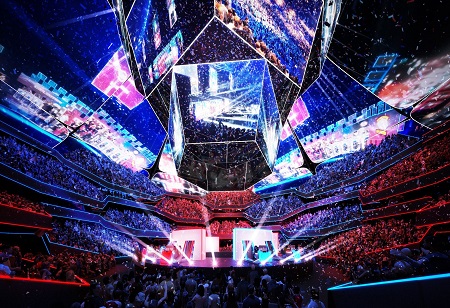How Esports Is Becoming Mainstream Entertainment
Competitive video gaming was not an activity that was taken seriously just a short time ago, and was regarded as a hobby of some basement-dwelling fans. We are already witnessing 2025, how esports has evolved and are competing with traditional sports head on over viewership, revenue, and cultural impact.
What began as an informal contest in the arcades and LAN parties has now expanded to be a multi-billion-dollar business with professional teams, sell-out events, and celebrity sponsorships. This shift is not exclusive to games but a general overhaul of how esports are operating in the entertainment, technology, community, and competition in a way that has attracted the eyes of millions.
It is estimated that this year the revenues will be 4.8 billion, and the viewers of esports will be more than 640 million people all around the world, which also means that esports is no longer at the periphery; esports is at the heart of popular culture.
The breakout of esports can be traced to its booming growth rates. The global market is expected to showcase an upsurge to a peak of 4.8 billion in 2025, versus the lowest of 1.38 billion in 2022, and a compound annual growth rate (CAGR) of approximately 5.54 percent that will see the market hit 5.9 billion in 2029.
Furthermore, the advertising and sponsorship alone constituted over 641 million during the last year, with brands like Nike, Coca-Cola, and Red Bull hastening to the fray in order to cash in on its enthusiastic and tech-savvy fan base. Also to note, the story told to the audience is even better, as over 640 million spectators are following the game, and these numbers are split into 318 million hardcore viewers and 322 million casual ones.
This is in competition with other major events, such as the Super Bowl, and tournaments such as the League of Legends World Championship have up to 6.94 million viewers in 2024. Asia-Pacific is the region with the largest audience (57%), with China and the Philippines being particularly the audiences of esports as a part of their lives. But North America and Europe are bridging the divide, with the U.S. market valued at 1.07 billion.
Also Read: From Advertising to Entertainment: India's Gaming Ban Sparks Transformation
Integration, Technology, and Celebrity Influence
The easy integration of esports with mainstream entertainment and sports can be seen as one of the factors that promote its mainstream rise. Major television channels, such as ESPN and BBC, now air esports events with the same seriousness as an NFL game or Wimbledon.
The announcement of the Olympic Esports Games in 2025, which will be hosted in Saudi Arabia, by the International Olympic Committee, is a landmark achievement, as it will finally authorize the use of competitive gaming on the largest sporting platform globally. Sports franchises are entering the market as well--such teams as the Dallas Mavericks (owned by Mark Cuban) and Manchester City have esports divisions, further muddying the physical and digital sports.
This cross-over is also brought to real life: in the Esports World Cup 2025, virtual arenas competed with stadium attendance, with mobile games such as Mobile Legends: Bang Bang attracting 3 million concurrent viewers.
The technology has been the fuel that has rocketed esports into the limelight. Streaming sites such as Twitch and YouTube have made it democratically accessible to all people as long as they have access to the internet, to watch the pros play in real-time.
By 2025, mobile-first viewership will be dominant, with more than 56 percent of viewers viewing on smartphones, particularly in the emerging markets of Southeast Asia and Latin America. Technological improvements like artificial intelligence-based analytics, virtual reality experiences, and augmented reality overlays serve to create a more immersive experience, turning matches into blockbusters.
To take for an example, Valorant, Counter-Strike 2, and PUBG Mobile are the most popular, with Dota 2 alone having over 29 million dollars in cumulative prize pools over the past few years.
The presence of celebrities has also solidified the mainstream status of esports. Music, sports, and tech stars are not only fans, but investors and players. CarryMinati (Ajey Nagar), a prominent Indian streamer, has expressed, "I love how the gaming community in India has grown over the past 2 years. There are so many streamers now & so many people who watch us." His passion underscores the fact that esports is a connector of generations and cultures.
On the same note, football star Cristiano Ronaldo and chess player Magnus Carlsen are some of the Esports World Cup ambassadors who can attract their huge fan bases to the game. Even tech visionaries see the potential: Elon Musk has praised the complexity of eSports, tweeting, "OpenAI first ever to defeat world's best players in competitive eSports. Vastly more complex than traditional board games like chess & Go." These endorsements attract new audiences and validate esports as legitimate entertainment.
Also Read: Top 5 Ad Campaigns 2025: Redefining Bonds in a Changing World
Inclusion, Education, and the Future of Esports
Esports is increasingly becoming inclusive and diverse culturally. With events such as female-only tournaments and emerging stars, women have now accounted for 28% of the North American viewers compared to 22% in 2020. Education is also adopting it: more than 260 American colleges have already implemented varsity esports programs with an average annual scholarship of between 1000 to 6000, making gaming an entry point to higher education and employment.
However, the mainstream path of esports is not an easy one. Critics claim it is not a true sport, citing the lack of exercise or the brief careers of players. However, as Akshat Rathee, co-founder and Managing Director of NODWIN Gaming, aptly puts it: "Esports didn’t come from publishers—it came from the community. India isn’t just into esports; it is helping shape its future. Esports will be a key pillar to the growth of sports entertainment in the future." This sentiment captures the industry's current dominance—fully engaged communities, interactive experiences, and global connectivity that traditional media struggles to match.
Moving forward, esports will continue to reach even higher heights. It will transform the entertainment world with an estimated number of 896 million users by the year 2029 and with other innovations such as metaverse applications. With barriers breaking down and additional demographics coming on board, esports is not only becoming mainstream, but it is defining the future of interactive media. As an aspiring hardcore gamer or a mere spectator, one thing is now apparent: the game has evolved, and esports is emerging victorious.
🍪 Do you like Cookies?
We use cookies to ensure you get the best experience on our website. Read more...






